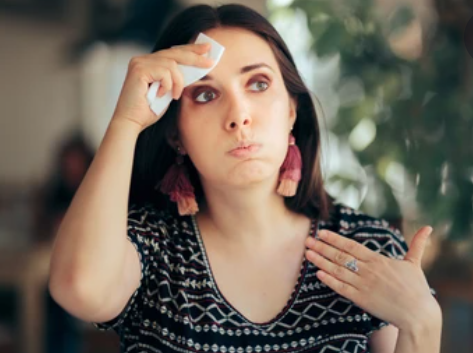What Causes Hot Flashes Apart from Menopause?


Some of the most common reasons for a hot flash include:
Hot flashes can cause a person to have the following:
A sudden feeling of warmth spreads through your chest, neck and face
A flushed appearance with red, blotchy skin
Perspiration or heavy sweating, particularly on the upper body
Rapid heartbeat
Anxiety-inducing sensations
The frequency and severity of hot flashes might differ from one woman to the next. A single episode could last as little as one minute or as long as five minutes. They can be mild or strong enough to get in the way of daily life. They can happen at any time of the day or night. Night-time hot flashes are also called night sweats and can cause severe sleep disruptions.
Menopause is a significant trigger of hot flashes. It is when a woman's ovaries stop releasing eggs, and her levels of oestrogen and progesterone decrease. This decrease in hormones is thought to be the reason behind hot flashes.
For severe symptoms, a doctor is likely to suggest hormone replacement therapy (HRT) to help regulate hormone levels and relieve menopausal symptoms, like night sweats. However, HRT may predispose a patient to breast cancer and heart issues. The OB/GYN will discuss all possible options before committing to a treatment.
Learn more about the signs, symptoms and treatments of menopause.
Many commonly prescribed medications, including steroids, opioids, antidepressants, and specific osteoporosis treatments, can cause a side effect known as hot flashes.
If you have hot flashes that make you uncomfortable, your doctor will probably switch you to a similar drug that doesn't make you feel so hot. He (or she) may also reassure you that the discomfort won't last long since hot flashes will disappear once your body adjusts to the medication.
It is common for people to wake up flushed and sweaty in the middle of the night as our body temperature naturally fluctuates during our rest hours
Excess weight can affect your metabolism and promote hot flashes as a body response. The stage in your life may also matter, as hot flashes are reported to be more likely in women who experience menopause and a subsequent weight increase.
Want to know the best diet plan for weight loss? Read our weight loss blog to learn more.
What you eat and drink may also contribute to a hot flash. Several alcoholic drinks, such as beer and wine, trigger skin flushing and increase feelings of heat. This is due to the chemicals in these drinks, which can cause blood vessel dilation.
Hot flushes may also be prompted by eating food containing the active compound capsaicin, like hot peppers and chilli powder, and foods with nitrite and nitrate compounds, usually found in processed foods like hot dogs and deli meats.
It is also common to experience an increased body temperature during/after drinking a hot beverage.

Anxiety disorders can cause hot flashes and various other symptoms like a racing heartbeat, nervous fidgeting, heavy breathing, increased sweating, and hot flashes. This symptom is associated with the body's release of stress hormones during a perceived "fight or flight" situation, increasing circulation and blood flow to the muscles and producing an uncomfortable, hot feeling.
Natural remedies like exercise, meditation, and yoga can help calm anxiety. If these don't work, you may suffer more severe anxiety and should consider seeking medical advice.
Niacin is a B vitamin that is often supplemented. Warm flashes or flushing are frequent adverse effects of the supplement. The reaction occurs as blood vessels dilate, causing blood to seem to appear on the surface of the skin and a rapid increase in body temperature.
Chemotherapy and radiation therapy frequently bring on early menopause in younger women. In addition, chemotherapy can hasten the onset of menopause in older women. Procedures like an oophorectomy may also bring on a hot flash.
To assist in the management of your symptoms:
Avoid triggers like stress and alcohol.
Try to keep yourself as cool as you can before bed by taking a cold shower and lowering the temperature of your room.
Natural materials like cotton, linen, and silk can also help to reduce your temperature.
If you're regularly struggling with hot flashes and experiencing too much body heat, it's best to check in with a doctor for proper guidance. The treatment options will depend on the underlying cause of your hot flashes. If hot flash symptoms persist, consult a doctor.
To learn more about the various symptoms of menopause and how to prevent them, read thoroughly here.
Plus get the inside scoop on our latest content and updates in our monthly newsletter.